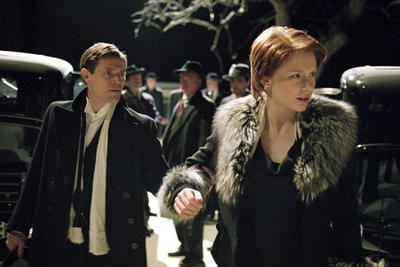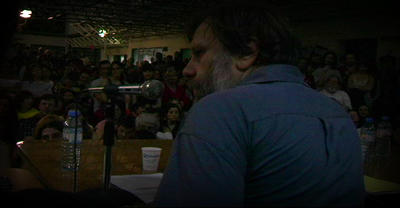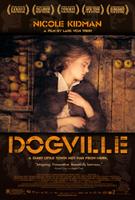


Perhaps the toughest day to write about is day four. A very big day at the festival--big films with big implications. Each is an expression of oppression--ideological, physical and personal. These three films are about asking questions and not neccessarily about finding answers ; or satisfactory answers anyway.
My most anticipated film of the fest was Lars von Trier's Manderlay, second part of his USA trilogy starting with 2003's Dogville and ending with his upcoming Washington. We all went out to see this one. Lars is definitely one of contemporary cinema's most thoughtful, passionate and provoking directors--expirimental but locked in accessible narrative; audacious, but only to good ends.
For those who have not watched Dogville, see it first.
This is not optional.

This is not optional.

Manderlay takes place on the Manderlay plantation in 1933, where Grace, shocked at the sight of slavery after emancipation, decides to enforce freedom. First though, the former slaves require some re-education on democracy and the freedom of rights, and this is where the film begins its slow inevitable decline...
In familiar Lars fashion, poor Grace (here played by the energetic Dallas Bryce Howard) finds herself tangled in a slowly closing web of decisions gone wrong. Not as straight or harrowing as Dogville, this film has a sort of symmetrical structure, but is still very clear in its message... I'm not going to say any more except that it's very good, compulsively watchable cinema. I'm not sure that it quite meets its predecessor, but that's for you to see, and all beside the point anyway. For me, the most interesting thing about it is its implications for the greater trilogy. Grace has been schooled in two films now, and her upcoming trip to washington weighs heavy in my mind as the one where these lessons might finally come bearing down upon her. What the two films suggest about the human condition is not good, and that includes for Grace herself. What is the signifigance of being alone? How will the conversations with her father end? Will she manage to use her power for good? And what might the third film imply about American politics? Will we have to wait for the end of the war to find out? Well, we'll need to wait at least until 2008 or 9, and then I guess we'll see.
Michael Glawogger's Workingman's Death was actually my first film of the day, and it intended, I thought, to showcase five of the worlds worst jobs; I oversimplified it a bit in my head. I went in expecting something that only criticized heavy labour. Instead what I got was a film that objectively and thoroughly explored it, observed it, sometimes commented on its origin, and often acknowledged the courageous efforts of its workers. It asks the questions, does hard labour still exist? Is it gone or just invisible? And what is the future?
The answer is that yes, it does exist, and you can find it here: in poor and developing countries. In the illegal mining activities of poor fathers in the Ukraine, sulpher miners in Indonesia, slaughter workers in Nigeria, shipbreakers in Pakistan and steel workers of China, we see the dwindling remnants of industries long gone, globalization taking advantage of cheap labour and people carrying on... because they need to carry on. The movie isn't too heavy in directing you to causes and effects, actions and consequences. It doesn't ask you for sympathy, suggest courses of action or even always provide you with reasons why these things are happening in the first place. What you are certain of though, is that these jobs are awful, rough, unhealthy and often dangerous. The portrait that he gives us of workers though is well rounded and generous--we're not shown broken, horrific lives in disrepair; instead, stoic, tough lives of people who still have senses of humour, friends, family and homes. The people react to their jobs in much the same way we do ours--unpleasant duties. I guess this is where the revelations come in though--that really, none of us have any excuse for not excelling in our easy, comfy lives. It's a fairly objective film, so you have to come to these conclusions on your own, but it's not difficult to see the painful divide between the haves and have nots.
As a film it doesn't offer connections and implications as much as offer facts for you to process yourself; the ending is especially frustrating for me in this way, as maybe I tend to prefer documentary film to take a stronger point of view. In the end it's well worth seeing regardless, a beautifully shot, almost nostalgic look at the death of the workingman--let's hope so.
The TIFF program description --.
Zizek! was the last film of the night, and it was not a good one. Another case of fascinating figure, poor filmmaking. This seemingly directionless film introduces us to Zizek, the 20th century's 'rock star philosopher'. He's a crazy, flustered, endlessly energetic fellow, and we hear many tidbits of insight into his opinions on... everything. We see him at lectures, on the TV, at home, in the car, in his publishers office... We listen to him talk about lots of stuff, but for the life of me, I cannot recall (nor could I understand then) how the film was structured. Maybe all the Lacanian talk went way over my head--maybe the young documentarian relied too much on intuition to guide the story; I'm not sure. It's both, but I'm tending to think that the most at fault is the latter.
For what do we learn about Zizek? Not what does he talk about, but what do we learn about him? He's a deeply conflicted man--someone who wants, no, needs to be heard, needs to be funny... but hates all the attention he's getting. He feels that the more people accept him, the less likely it is that they're listening to what he's actually saying. It could be true, and it's definitely a shame, but this unbearably directionless film will certainly not help his cause (except in letting us know that much).
For what do we learn about Zizek? Not what does he talk about, but what do we learn about him? He's a deeply conflicted man--someone who wants, no, needs to be heard, needs to be funny... but hates all the attention he's getting. He feels that the more people accept him, the less likely it is that they're listening to what he's actually saying. It could be true, and it's definitely a shame, but this unbearably directionless film will certainly not help his cause (except in letting us know that much).
The TIFF program description --
And his EGS faculty bio --

No comments:
Post a Comment